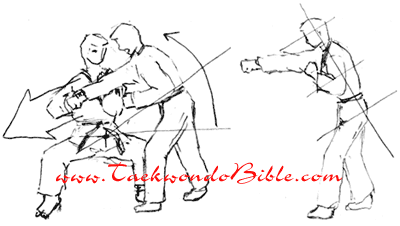| |

3-2-1. Ideal Low Pose
You can obtain the right way of lowering pose only when you build your good
Samjae in your lowering pose. Your samjae refers to that of spirit inclusive
of that of body. The samjae of mind is intention, sight and breath. The samjae
of body is head, chest and lower abdomen, which are three centers; Haneul, Tang,
and Saram.
Let me explain the samjae of spirit; intention, sight and breath. It is the
bloody spirit that corrects your Taekwondo pose, which is the attacking mind.1)
The Taekwondo motion is for suppressing your opponent by means of attack and
defense, and this motion can be corrected naturally when you have the bloody
spirit in your mind. The sight means you watch him; you see his eyes at first,
so you see his mind. What see his mind ultimately is not your eyes but your
mind. The breath refers to just closing Ki(閉氣).2)
To say the Samjae of body, that Haneul is high while Tang is low is its own
proper place. Saram should be comfortable between them. So, when you lower your
pose along the proper places of Samjae, you should bent your knees down lifting
your head high and dropping your hip(lower abdomen) low. For these, you should
not lower your spirit though you lower you pose, and you should make deep breath
though you keep high spirit, and you preserve your calm sight among them.
 But for the
neatly arranged Samjae you cannot build firm and precise technique. For "It
cannot be, when the root is neglected, that what should spring from it will
be well ordered."3) An Example of confused
locations of Haneul, Tang and Saram that is caused by the disordered Samjae
can be given in the case you keep high hip in spite of your low pose. In this
case you can be fell forth down only by your opponent's slight pull. And it
is difficult and not powerful to punch or kick from this pose. Particularly
you cannot be swift when you intend to move in any direction. This is that,
when the root is neglected, what should spring from it is in full confusion. But for the
neatly arranged Samjae you cannot build firm and precise technique. For "It
cannot be, when the root is neglected, that what should spring from it will
be well ordered."3) An Example of confused
locations of Haneul, Tang and Saram that is caused by the disordered Samjae
can be given in the case you keep high hip in spite of your low pose. In this
case you can be fell forth down only by your opponent's slight pull. And it
is difficult and not powerful to punch or kick from this pose. Particularly
you cannot be swift when you intend to move in any direction. This is that,
when the root is neglected, what should spring from it is in full confusion.
To stand in low pose is to rely on the structure of Bang(□), hence the firmness
and the balance in standstill. What the firmness of Bang means is that you can
obtain stability in changes as you support more than four points. In the low
pose of Taekwondo those four points correspond to two feet, the downer stomach
that depends on feet and the head on the trunk.4)
In this course, if you can stand low with only one leg along the way of Haneul,
you can advance changes with another, which we can say is the firmness in change.
By contrary, if you fail to keep the correct position of Samjae in the standing
pose, you will lose this firmness of Bang, which is due to that your lower stomach
is too high to be supported by two feet and your head leans to fail to be supported
by your lower stomach, losing its supporting points.
On the other, your low pose also enables you to concentrate your offense and
defense easily, which means the stableness of your technique suppported by the
meaning of Gak(△). Regard your head and the supporting leg as two points and
the <Nal>5) of the offense and defense
as one point, then you should concentrate your whole body between the head and
the supporting leg on the <Nal> so that you can “hit
the opponent with everything of yourself in your offense."(Ch. 34)
But your high pose will deprive of this concentration. This is because the <Nal>
of the offense and defense gets dull, which you can see in its appearance.
<footnotes>
1) "when you attack the opponent you should thrust him
with your killing spirit at first, catch him with your piercing sight the next,
and then control him with your motion."(Ch.34)
2) About breath, refer to 6-6. Breathing
3) The Great Learning, 00-07 其本亂而末治者否矣.
4) 그 중에서도 주춤서기를 논하자면, 두 발, 하단전, 머리의 네 점에다 그 속에 다시 두 발과
두 무릎의 네모(즉 방:□)을 가지므로 더욱 튼튼하다고 하겠다. 이 튼튼함에서 주춤서기를 사용하는 기법의 파괴력이 나온다.
5) This <Nal> refers to the Sseuim-nal(Ch.
51).
|
|